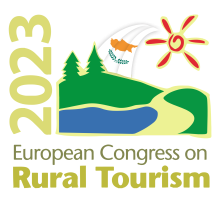CONCLUSIONS
CONCLUSIONS
Rural Tourism has come to age. Being considered for many years as a minority and niche sector, after COVID-19 and supported by long-term shifts in visitor’s values and preferences, in 2023 it is a recognized part of the tourism economy in Europe with steady growth.
This brings along the need to develop services to a level that is in line with the professional tourism standards. The personal contact between hosts, community and visitors remains at its heart. However, this needs to be complemented by improving skills to understand visitor expectations, design competitive products, and keep up with the quick developments in the fields of digitalization and sustainability. With increasing international demand, also interpersonal, intercultural, and interpretative skills are in high demand.
Holidays are an escape from daily routine that is marked by megatrends in urban society. The characteristics of rural areas makes them the ideal choice for such an escape. With a smart analysis, this approach can give many hints about where to position our sector and make it even more attractive.
However, growth and higher number of visitors pose new risks, as does climate change. Taking the lesson from mature tourism destinations, an excess of visitors (over-tourism), lack of local human resources, generation change, limited resources like water or the impacts on local communities must carefully be considered and anticipated if our sector wants to remain sustainable and credible.
Generational change is an ongoing process and often, a challenge. Millennials and Generation Z are the upcoming markets with high potential, and the are also the service providers of the future. They are intrinsically motivated by tourism products that are based on rural areas and their resources: nature, health, ecology, activity and sports are just a few of them. These new travellers bring along changes in the way rural tourism needs to understand and present itself regarding content, image and communication. Real sustainability and authentic experiences are important here, as is the digitalization of all processes and a credible, personalized value proposal.
Rural Tourism is not only a business. It is also linked to a lifestyle that responds well to the shifting attitudes in society around work and life. Generation renewal will attract at the same time a new generation of visitors and rural entrepreneurs. Together with a renewed approach that brakes with traditional concepts, rural tourism thus has the potential to successfully address and benefit from the multiple changes in tourism markets that can be expected in the coming years.
